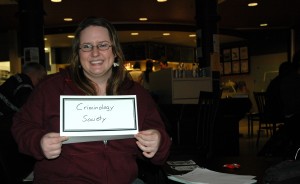Family scholarship campaign risks losing half it financing
March 10, 2011 by Steven Maisey · Leave a Comment
Students at Kwantlen Polytechnic University face a future where some funding for scholarships and awards is cut in half.
The Family Campaign, a program designed to allow faculty, employees and administrators at Kwantlen to donate money to scholarships and awards, faces the prospect of losing matching money from the university. In the past, Kwantlen has matched donations from faculty and staff.
“Right off the top, it cuts in half the amount of finances we can contribute to students,” Katie Kinch, an advancement officer at Kwantlen, said.
According to Kinch, there are approximately 800 scholarships and awards across Kwantlen that students can receive, with many of those funded by donations made to them by staff and faculty.
“We have about 800 scholarships and awards across Kwantlen. Of those 50 are exclusively funded by staff, faculty and administration at Kwantlen,” Kinch said.
Last year, through the program, staff and faculty raised over $100,000 for student awards and scholarships. At the time, the university had allotted money in its budget for the program and matched all employee donations, raising the total amount to more $200,000.
This practice is common at other institutions, Kinch points out.
Faculty and staff who choose to donate determine where the money they donate goes. This usually means that the faculty member who is donating will give money to the faculty or program they are a part of, or the field they are currently in.
Kinch not only believes that not receiving additional money from the institution will hurt the program right away, but that it will continue to hurt the program, which also raises money for library resources, further down the road.
“In the past, we have received messages that it is very disappointing for the staff who choose to donate and see it as a real benefit to their employment with Kwantlen and an added value that the institution recognizes their financial commitment back to the institution and matches their giving, so I think it will have a significant impact on the overall performance of the campaign,” Kinch said.
Kinch thinks that the Family Campaign sends a strong message to the community at and around Kwantlen about the staff and faculty who work at the school. “It reinforces a really strong message that we are doing good work here,” Kinch said.
Anyone wanting to learn more about the Family Campaign at Kwantlen can visit its website
Corriveau prepares Kwantlen for emergencies
March 10, 2011 by Steven Maisey · Leave a Comment

Guy Corriveau is Kwantlen's new manager for emergency planning. He has held that position since June 2010. (Photo courtesy of kwantlen.ca)
Guy Corriveau has only been on the job for seven months, but Kwantlen Polytechnic University’s new manager of emergency planning is already bring the university up to speed on emergency planning.
Corriveau is Kwantlen’s first manager of emergency planning, a job he began in June 2010. In the seven months since, Corriveau has been steadily bringing all the Kwantlen campuses into emergency planning by instituting programs, plans and exercises, such as January’s Exercise Shake Out BC.
This is the first time Kwantlen has had an office of emergency planning, and Corriveau says that the university is committed to doing the job right.
The university has set aside money to help Corriveau upgrade communication systems at Kwantlen, to equip Kwantlen with the tools it needs in case of an emergency, as well as giving him flexibility to propose and test different programs, such as volunteer emergency response teams like the ones at BCIT.
Corriveau sets up programs and systems on what he calls his three-by-three-plus-one matrix. This matrix includes reviewing, establishing and implementing evacuation protocols, lockdown protocols and communication issues, along with developing a management structure so those systems can be implemented.
These systems will take time to be put in place, Corriveau said.
“We can’t go into it hastily, we can’t go into it quickly, we have to go into it deliberately, because if you go into in quickly you are likely to make mistakes,” Corriveau said.
Corriveau said that a plan has to be put in place as soon as possible, with as many people involved with the plan as possible to ensure that when an emergency strikes students and faculty will be ready.
One of Corriveau’s goals is to create emergency response teams on every campus at Kwantlen. He says that this approach would put the onus on both students and faculty to get involved in emergency planning. The emergency response teams could be made up of students and staff volunteers. The teams would be trained in light-urban search and rescue, first aid and basic emergency response and recovery.
The purpose of emergency planning at Kwantlen is to create an environment where students and staff can feel safe while they study and work.
“My personal goal is to help Kwantlen achieve a safe and ready learning environment. We need to get to a place where people feel safe being here,” Corriveau said.
Corriveau has the backing of the leadership at Kwantlen and support to invest in emergency planning. The engagement of the leaders at Kwantlen allowed Corriveau to commit Kwantlen to participating in Exercise Shake Out BC, an exercise the organizers estimate 470,000 people participated in.
“I asked senior management if I could commit Kwantlen to participating, and they said yes, and that is the basis of good emergency planning support from leadership,” Corriveau said.
Bright lights, big screen: Vancouver’s Pacific Cinematheque a safe haven for independent filmmakers
March 10, 2011 by Amanda Punshon · Leave a Comment

Jim Sinclair has been bringing the best of Canadian art-house and independent cinema to the big screen for 20 years as the executive director of Vancouver's Pacific Cinematheque. (Photo courtesy of Pacific Cinematheque)
New technology has made it cheaper and simpler to make films, but with so many indie films floating around on the Internet, it’s hard to get noticed.
That’s where theatres such sa Vancouver’s Pacific Cinematheque come in.
Jim Sinclair, who has been the theatre’s executive director since 1991, said that Pacific Cinematheque’s mandate is to show innovative, artist-driven work.
They accept unsolicited submissions, which are then screened by Sinclair, who decides whether they are good enough to be screened and whether there will be an audience for them. As with films submitted to film festivals, those shown at the Cinematheque are not required to be rated by Consumer Protection B.C.
In the past, this meant that films screened at the Cinematheque were not subject to censorship, Sinclair says. Nowadays, because of the Internet and because ratings are less strict, that’s less of a concern.
But not needing to be rated is still a good thing for filmmakers. It’s not the filmmaker who pays to have their movie rated, it’s the distributor. If they don’t have a distributor, they have to absorb the costs themselves.
And getting your film rated isn’t cheap. According to the Consumer Production B.C. website, each copy of a film that is to be screened has to be rated. In B.C. it costs $12 for the first 10 minutes of the first copy, and then $1.20 for each subsequent minute. For a 90-minute movie, that’s $108. Each additional copy costs half of that ($54 dollars for a 90-minute movie).
But Sinclair says that it’s the culture of the Cinematheque that makes it such a great place for independent and non-mainstream film.
“There’s a whole world of cinema out there that if you relied entirely on what was playing at the multiplex, not only would you never see it, you’d never know it existed,” he said. “Our whole culture, our mandate here is geared toward providing access to the great achievements of Canadian and international cinema, and being a cultural organization that programs that work.”
Sinclair had some parting advice for filmmakers.
“Try hard. It’s work. If you have something that’s good, you need to get people to see it,” he said. “There’s nothing self-effacing about calling up people who curate film or program cinemas and letting them know that you have a film and getting into their hands so they can see it.”
How Theatre Terrific brings equality to the stage
March 10, 2011 by Sarah Casimong · Leave a Comment
Theatre Terrific does what most theatres are scared to do: Put new actors and people with disabilities and mental health issues on the same stage as professional actors who don’t have those challenges.
It started in 1985 when a group of parents started theatre classes for their adult children with developmental challenges. They hired a professional instructor, with the aim of giving their kids a creative outlet.
The theatre is now open to anyone with or without a “challenge.” According to Susan Uchatius, artistic director, it is important for them to treat everybody equally.
“You’ll have professional actors, you’ll have maybe someone in a wheelchair, you’ll have someone with Down syndrome, you’ll have some people that have mental health issues,” said Uchatius. “[Just] because you might have a labelled challenge or disability, you’re not special in this circle. You’re going to be equal to the person beside you, who may be a professional equity actor.”
As challenging as that may sound, Uchatius insists that the process to putting all actors on even ground is simple. It starts with what they call stonework: All the actors quietly stand in a circle, breathe, make eye contact with the person beside them and pass around a stone.
“It’s all about finding out what our human connections are,” said Uchatius. “It’s so amazing how, by this ritual, you find that you are more similar than you are different. We all have the same hopes and desires and dreams, it’s just in a different package.”
Uchatius hopes that the theatre community and society in general will look at Theatre Terrific as not disability or charity work, but as a form of valid artistic expression.
“When I see a theatre that has disability or is mixed [actors with and without disabilities], I see a lot that’s done from a charitable aspect and it offends me, to be honest,” said Uchatius. “When I see that people are being indulged, you’ll have one or two people that are different and the expectation isn’t there for them to do anymore.
“What Theatre Terrific does is we give the respect of challenge. If you’re going to come in the door to work, like any other artist, be expected to fall, be expected to make a lot of mistakes, be expected to work hard, be expected to push your boundaries. That’s respect.”
Even though actors of different backgrounds and challenges are treated and seen as equal, Uchatius still appreciates the variety of people and the diversity it brings to the stage.
“I’d rather work at this theatre than any other kind because it’s so mosaic, it’s so multicoloured,” said Uchatius. “It’s like an incredible rainbow because you’re going to have perceptions that are so unique.”
Opinion: CRTC keeping Canada in tech stone-age
March 9, 2011 by Jeff Groat · Leave a Comment
At the beginning of February, the Canadian government ordered the CRTC to review its decision to allow companies to meter data usage on the internet and charge users based on the amount of data they use. The problem is the original ruling doesn’t make sense.
Data is not finite in the ways that resources such as drinking water are. Data is not something that a country or economy needs to produce, mine or refine. Data is not inherently valuable in itself, as diamonds or barrels of oil are. Data cannot be saved in times of plenty and used in times of scarcity.
Proponents of the metered data use the analogy of water. In countries where a flat rate is charged for a finite resource such as fresh water, this leads to a culture of overuse: people use as much water as they possibly can, simply because if they don’t, someone else will. It’s essentially a use-it-or-lose-it mentality that leads to waste and inefficiency.
In a way, data is the reverse of this. Unused data is inefficient and wasteful. Unused data represents an economy’s sluggishness. We can assume that the more information that’s flowing over the internet, the more valuable ideas are being exchanged and more economic growth can follow.
If the CRTC doesn’t realize that internet use will be the future of a global economy, it will put in place measures that will jeopardize any potential growth to come from inside Canada.
Technological connectedness should be a hallmark of Canadian culture. The CRTC should never again consider plans to meter use of the internet in any way.
Students surveyed over idea of a shorter semester
March 9, 2011 by Jocelyn Gollner · Leave a Comment
Do students want a shorter semester?
That’s the question that the Office of the Registrar at Kwantlen Polytechnic University is trying to answer.
Robert Hensley, registrar at Kwantlen, sent out an e-mail Feb. 21 asking for students to take a brief survey to determine whether they thought that the semester should be shortened by one week.
Currently, Kwantlen has three 15-week semesters a year (14 weeks of classes and one week of exams). The majority of other postsecondary institutions in B.C. have three 14-week semesters (13 weeks of classes and one week of exams).
Hensley could not be reached for a comment on the issue despite repeated tries.
A representative of the Kwantlen Student Association said that the KSA hasn’t taken a stance on the subject yet. However, she said that Brad Head, director of academics for the KSA, has reserached semester length, and found that people actually do better in shorter semester lengths.
“Some of us believe that it’s not that great, because you’re paying more per week of study essentially. But the short answer is that we don’t have an answer now. We have to develop policy and then council has to approve the policy before we can actually take a stance on something,” the KSA representative said.
The majority of students we talked to seem to be in favour of a shorter semester length.
“I agree with it,” Cisi Zhao, a Kwantlen business student, said. “I think it benefits students, because a lot of students want to go back to their hometown and if the breaks are too short, it’s not good for us.”
Justin Wong also wants a shorter semester.
“My friends that go to other schools are always done before us and it just feels like everyone else is already out there having fun and we’re still stuck in school. It just makes me not want to study,” he said.
Crystal Tang had a different idea about the subject.
She thought that a longer semester is more beneficial because then more detail can be explained in the course and instructors don’t need to rush through the curriculum.
.
Criminology club to make a comeback
March 9, 2011 by Jocelyn Gollner · Leave a Comment

Leah Godin sits at Kwantlen's Club Night on March 3. She is in the process of starting up the Kwantlen Student Society.
Leah Godin, a third-year criminology student, is in the process of making the Criminology Student Society a reality again.
Up until last year, there was a Kwantlen Criminology Club, but according to Godin, the club dissolved after the club’s president graduated and no one took over the role.
Now Godin is encouraged and excited to bring it back to Kwantlen. But this time as a society, instead of a club. One of her instructors just thought it sounded better that way.
“I’ve announced it to a few of my classes, and I’m getting the instructors to tell their classes,” Godin said. “There are a bunch of people who are really excited about doing it, so it’s just the initial bit. You need to get so many people to sign up, which isn’t that much really, it’s only like 10 members.”
Godin had about 10 people sign up at the Kwantlen Club Night alone, which was on March 3 at the Grassroots Cafe.
The society will start out with a general meeting to see what students want from the society. Then, once it’s up and running, there will be field trips, talks given by instructors from Kwantlen and other post-secondary institutions, movie nights, pub nights, discussion groups, as well as information on how students can get involved in their community.
This club is open to all Kwantlen students, not just criminology students.
“I don’t want to cut anyone out of an opportunity because they might actually realize that they really like criminology and maybe later major in it,” Godin said.
It’s clear that Godin is passionate about starting up the Criminology Student Society.
“For some reason, this semester I’ve been getting really involved with what’s going on around campus,” Godin said. “The possibilities are endless, and I just feel that all Kwantlen students should be able to embrace what’s out there and what’s available.”
If you’re interested in joining the Criminology Student Society, email Godin.
Credit cards: it’s no small change
March 9, 2011 by Hayley Woodin · Leave a Comment
If you fancy a bottle of Coke or a sugary snack but don’t have the cash, you can indulge your sweet tooth by adding a buck fifty to your credit card bill. Several vending machines throughout Kwantlen give students the option to swipe their VISA or Mastercard, but that’s a convenience students can’t use when it comes time to pay their tuition.
The school chose to end credit card payment for tuition beginning in the fall 2010 semester, explaining the transaction fees credit companies charge is “quite absorbent,” especially when thousands of students pay their tuition during the same period.
The university has stated that it expects to save $250,000. The money will go to students in the form of scholarships and bursaries.
Kwantlen isn’t the first post-secondary institution to implement the change. Both the University of British Columbia and Simon Fraser University have also stopped accepting credit cards as a method of tuition payment.
On the Kwantlen website, it states that the only things domestic students can’t pay with a credit card are tuition, student fees and KSA fees. Other fees and services are payable with credit.
According to the school, “you can use your VISA or Mastercard for the commitment fee but that’s as far as it goes.”
Instant Theatre: a quick education in improv comedy
March 9, 2011 by Amanda Punshon · Leave a Comment
Amanda Punshon and Brian Russell take a look at long-form improv comedy from the perspective of Instant Theatre, a improv team and school that has been around since 1994. The giggles, guffaws and great on-the-spot comedy that the group is known for are all here, including interviews with Instant Theatre’s artistic director Alistair Cook and one of the group’s performers, Brynn Peebles.
START hosts bake sale for Heart & Stroke
March 1, 2011 by Matt Law · Leave a Comment

START Volunteers (left to right) Naveen Zafar, Luke Arathoon and Sunita Sohi hope to raise $2,000 for the Heart & Stroke Foundation by holding a cupcake drive. Photo by Matt Law
Bring your toonies to Kwantlen campuses this week — START is hosting a cupcake bake sale to benefit the Heart & Stoke Foundation of BC & Yukon.
The cupcake sale starts Wednesday, March 2, in the rotunda on Richmond campus from 11 a.m.-4 p.m. and moves to the Surrey courtyard on March 3.
Cupcakes cost a minimum donation of $2 and proceeds go to supporting the KUSA START Volunteer Big Bike teams which will ride May, 20 at 4 p.m. and 5 p.m. at Central City in Surrey.
Cupcake sales have become a fairly common sight on Kwantlen campuses and have been used to raise money for everything from graduation events to breast cancer.
This is the first time the START program has run a sale benefiting the Heart & Stoke Foundation said Naveen Zafar, START’s volunteer mentor.
The START Volunteer program was established in 2010 with a goal of connecting Kwantlen students with their community. Zafar and several other volunteers had been involved with the Heart & Stroke Foundation in the past but had never organized anything through Kwantlen.
“The Heart & Stroke Foundation has nothing to do with the bake sale; we are just donating all of the money because we believe it’s a good cause,” said Zafar.
Many of the volunteers were interested in baked goods, so START purchased close to $195 worth of cupcakes from a bakery that uses all-natural ingredients. The Grassroots Cafe will also be donating hot chocolate and iced tea for the sale. START has a goal of raising $2,000 from the cupcake sale and other donations but Zafar believes they will be able to raise much more.
According to the Heart and Stroke Foundation, there are an estimated 70,000 heart attacks in Canada every year; that equals one every seven minutes. Over 16,000 people die as a result of heart attacks each year in Canada.



